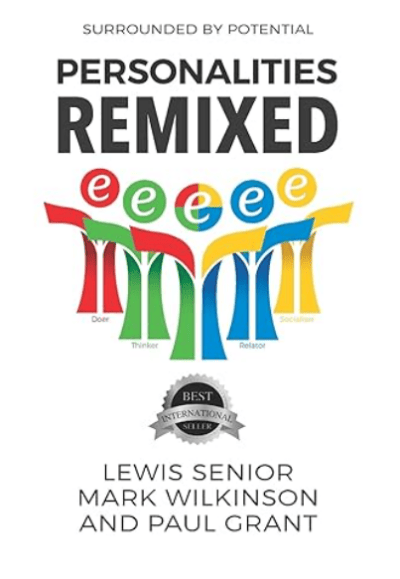
Guest post by Paul Grant, who is a serial entrepreneur, a leading expert on personality diversity and co-author of Personalities Remixed.
In today’s connected world, the ability to understand others isn’t just a soft skill – it’s a crucial part of effective leadership, communication, and collaboration. Tools such as the E-Colours and Personal Intervention offer practical frameworks that promote self-awareness, empathy, trust and stronger relationships.
The E-Colours framework identifies four core personality styles; each linked to a colour:
- Red (Doer): Action-oriented, direct, decisive
- Yellow (Socialiser): Outgoing, enthusiastic, optimistic
- Blue (Relator): Loyal, caring, empathetic
- Green (Thinker): Analytical, detail-focused, cautious
Personalities Remixed
Most people have two dominant colours that shape how they think, act, and communicate. For example, a Red/Yellow may be fast-moving and persuasive but prone to overlook details. A Green/Blue, in contrast, might be detail focused and empathetic but hesitant in fast-changing situations.
The power of this model lies in creating a nonjudgmental language for understanding differences. Instead of labelling behaviours as right or wrong, personality diversity helps teams recognise and value diverse strengths – and potential limiters.
The Value of Personality Diversity
When teams understand each how each other ticks, collaboration improves. For instance, a Red or Yellow manager may prefer quick decisions, while a Green or Blue employee might need time for planning. With mutual awareness, both can adjust their approach to work better together.
This awareness reduces conflict and enhances communication. People stop reacting out of misunderstanding and start communicating with intention and respect.
Personal Intervention: Pause Before You React
Knowing personality styles is only part of the equation. Emotional intelligence also means managing your own behaviour – especially under stress. That’s where Personal Intervention comes in.
This tool encourages a pause before responding, helping individuals choose a thoughtful action instead of reacting impulsively.
It involves three key steps:
- Pause – Notice your emotional trigger.
- Think – Consider what’s driving your reaction.
- Choose – Respond in a way that reflects your values and goals.
For example, a Red leader receiving critical feedback might usually become defensive. With Personal Intervention, they pause, reflect, and choose a respectful, growth-minded response instead. This creates trust and psychological safety.
Understanding yourself and others
Building self-awareness, as well as awareness of those around you, is critical for mutually-respectful relationships.
Understanding your own E-Colours helps you predict how you might behave under pressure. For example, a Red may dominate conversations, while a Blue might withdraw from conflict. Personal Intervention allows you to regulate those tendencies and choose more productive behaviours.
Equally, knowing someone else’s E-Colours helps you tailor your message. A Yellow speaking to a Green can slow down and focus on structure. A Blue communicating with a Red can be more direct while staying kind.
When both parties use these tools, communication becomes intentional, respectful, and far more effective.
Challenges and Culture Shift
Though simple to understand, applying these tools consistently requires practice, reflection, and humility. People must be willing to confront potential limiters – like a Yellow’s tendency to dominate conversations or a Green’s hesitation to act.
Importantly, our personality makeup should never be used as an excuse – ‘That’s just my Red!’ – but as a guide for self-awareness and empathy. Success comes when the framework becomes embedded in daily culture through ongoing reinforcement.
Conclusion
Personality diversity is a strength, not a problem to solve. With E-Colours and Personal Intervention, individuals and teams gain practical tools to understand themselves and others, improve communication, and build meaningful relationships.
In a world that increasingly values emotional intelligence, adaptability, and inclusion, these frameworks offer not just insight – but transformation.
Paul Grant is a serial entrepreneur, a leading expert on personality diversity and co-author of Personalities Remixed.
See more breaking stories here.